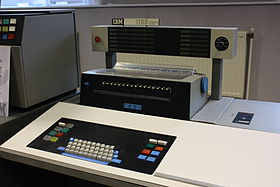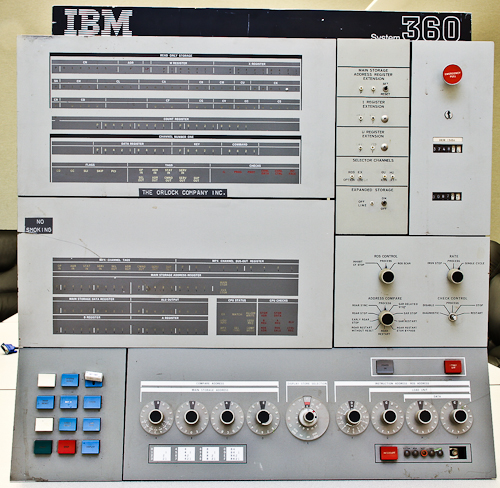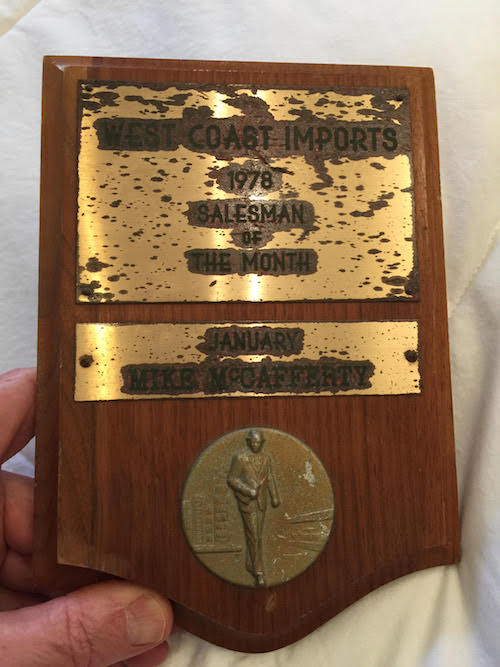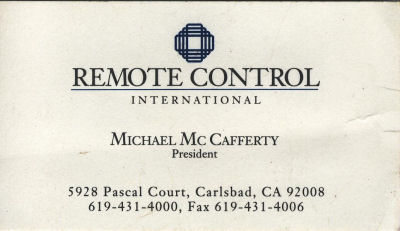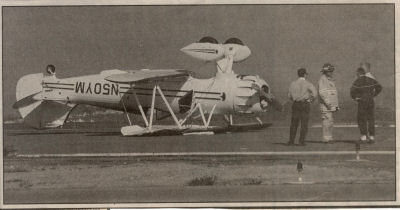|
Adventures in BusinessThe true story by
I am a serial entrepreneur. |
|
First experimentsThere is a vague memory of my first business adventure being a lemonade stand, out in front of the house. Next came the Lynnwood Cycle Shop, a bicycle repair service for the kids in the neighborhood. I worked with my brother Bud in that business. I enjoyed making things work, but I really liked getting paid for it. It became clear to me early on that there is really no limit to your success if you are in your own business. I was hooked. Being a newspaper delivery boy was great work, and taught me the importance of excellent customer service (keep the paper out of the bushes!). It also built a strong right arm that would help with Frisbee and biplane flying later on, and helped with the fundamentals of accounting and cash management. When I was old enough, I set pins at the local bowling alley. Yes, in a time long, long ago, actual human beings would reset the pins after bowlers knocked them down. It looked a lot more dangerous than it was, but sometimes you would get hit with a flying pin. It hurts! Although we would get paid an hourly rate, the real money was in tips. If you knew what you were doing, you could kick a pin just as the ball would hit, and increase a player's score significantly. If they scored big, they tipped big. It was, once again, customer satisfaction as the key to success. Same thing with caddying at the local golf course. For me, this was tough work. I was not built to carry two monster golf bags around, but I did it because I needed the money. The more you worked, the more money you made. The more you took care of your customers, the more money you made. I evolved away from dangerous work, and physical labor, and became a "soda jerk" at the ice cream fountain at the local drug store. It was easy to see that putting in a little extra ice cream in a root beer float would normally bring an extra dime tip. The owner of the store didn't agree with my economics, as it was his ice cream, and I was getting the tip. But it was a great job because I got to read all of the hot rod magazines and comic books. And be the center of attention when the girls dropped in. It may have been my first understanding of "fringe benefits"! Once the car bug hit me, I worked in a gas station, pumping gas, cleaning windshields, fixing flat tires... The station owner wanted me to check the oil on every car that came in. He figured that if I really pressed the people to check the oil, then when the hood was open we would have an opportunity to sell more stuff. That really excited me, and soon I was setting new records for selling more stuff than anyone else. I got good at selling windshield wipers, tires, batteries, fan belts, hoses, additives, you name it! Unfortunately, the owner wouldn't pay me a commission on all that stuff, but I could still see the principle at work.
|
|
An institution is the lengthened shadow of one man. Emerson Take a Biz Cookie: My Favorite Business Quotes
|
College CapersDuring the '50s and '60s, all young men were required to serve their country in the military. There were few choices involved. Either you were drafted into the Army, or you could enlist in some other branch of the military such as the Air Force, Navy, Marines, etc. The law was written that all men at the age of 18 must register with the Selective Service System. There were only three ways to avoid "The Draft" as it was called. 1. If you were "unfit" for military service, they would give you an exemption. This means you have some physical and/or mental condition that makes you undesirable. I was fit, and was not about to shoot myself in the foot (literally!) to avoid the military, so that left two other options. 2. If you went on to college, you could get a deferment of your military obligations until after you graduated from college. I had just completed 12 years of institutional education (8 in elementary school plus 4 in high school), and I was looking for something a little more interesting than another 4 years in an institution, so that left me with the only remaining option: 3. Be Married. Choosing the least of 3 Evils, I asked my girlfriend du jour to marry me. I had always been attracted to women with high intelligence and an delightful sense of humor, but I was a bit taken aback by the laughter that followed my earnest proposal. The options were narrowing: for the next 4 years I would be either soldier or student. I mentioned my decision to my father. "Where would you like to go to college?" he asked pleasantly, and with what I thought at the time was a benevolent smile. This was not something I had spent a lot of time thinking about, but I knew where I didn't want to go. My older brother had just completed his first year at Notre Dame, so I preferred to find some place where I could stand on my own and not be cast in the role of "the little brother". "Harvard? Oxford?" I said, completely innocently. I haven't heard my father laugh so hard before or since, it was the high moment of his wonderful sense of humor. When he finally calmed down and regained his composure and reassumed his persona as Great Provider, he told me that he had heard of a place that might accept me. He knew that this would not be an easy thing. I was just barely graduating from high school. Academic excellence was not among the goals I pursued. Girls, cars, and "testing the System" were more to my liking. Therefore, without the proper academic credentials, it would be a real challenge to get into any decent college. But I had complete faith in my father's abilities. He took on this great challenge knowing that to fail to get me into college would be to put me into the military. And that could mean getting shot at. This was now a life and death situation. It was a few days later that my father and I were sitting in the office of the President of Mt. St. Mary's College (now University), a small Catholic boys-only (now co-ed) institution located in the foothills of the Blue Ridge mountains of rural Maryland. I remember nothing of the conversation except one sentence uttered by my father: "Monsignor, I know Mt. St. Mary's doesn't need my son, but my son needs Mt. St. Mary's!" It was at that moment I knew my future as a student was assured. The following four years were filled with the most unlikely misadventures, which I call Capers, and Webster defines as "capricious escapades".
|
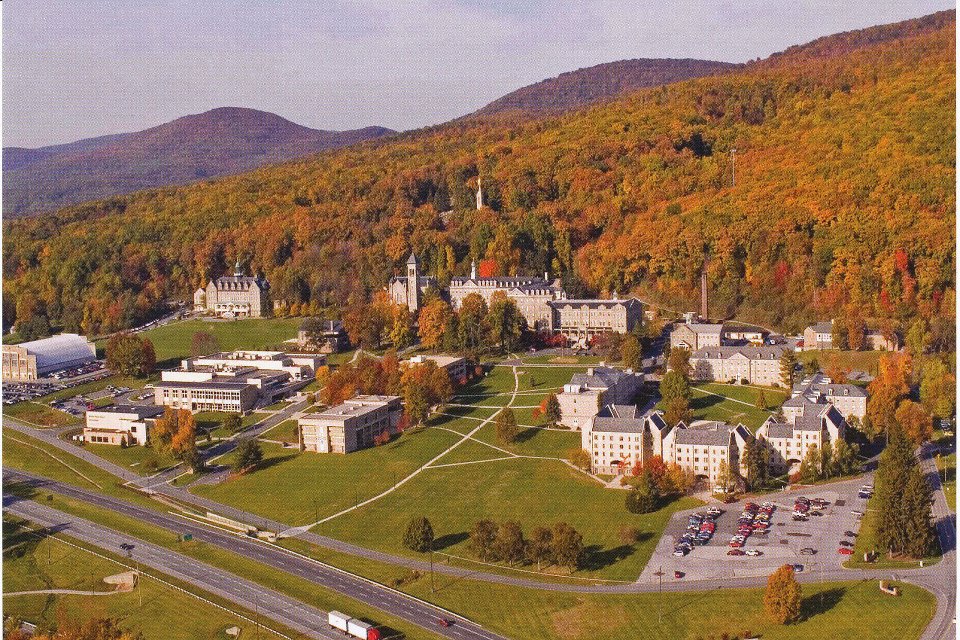
Mt. St. Mary's College, Emmitsburg, MD. Scene of many a caper!
It was when I got to college that the entrepreneurial adventures really began. As a new freshman,
living away from home for the first time, and off campus, I was truly on my own and my creative
juices really bubbled up. My first money making adventure was to create a desk blotter, about
24"x36", for every student in school. On this blotter I sold advertising space to the local
merchants, and distributed the blotters free to every student's desk. For the students it was
a handy reference with phone numbers and addresses. For the merchants it was a great way to keep
their ad in front of the students all the time. The merchants loved it and I sold out the spaces
on the blotter very quickly. I remember the number $600 as my profit on the deal. It was a couple
of weeks after this coup that the chairman of the yearbook advertising committee visited me, accusing
me of using deceptive business practices in getting the ads, telling merchants that it was a school
sponsored business. It wasn't true of course, he was just miffed because I had beaten his people
to the merchants, and when they were hit twice in short succession for advertising, they all said
"Hey, your man McCafferty was just here last week!" A minor misunderstanding, of course, but it
would set the stage for further legends to follow.
|
|
The entrepreneur is essentially a visualizer and an actualizer... He can visualize something, and when he visualizes it he sees exactly how to make it happen. Robert L. Schwartz
|
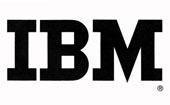
The Great IBM CaperAnd then Fate, literally, opened a door! I was walking down the hallway of the Student Union building, on my way to get lunch, not a care in the world, got a job, school is out in a couple of weeks, life is good. A door opens out into the hallway, surprisingly quickly, almost hitting me, and in a reflex of self defense, I grab the door handle to stop the swing. A fellow senior is attached to the other side of the door handle, looks up at me, grins, and asks "You next?". I told him, no, I was not next, but why the smirk, and what would happen if I was next. He explains that on the other side of that door was a gentleman from IBM who was looking to hire a salesman, and that IBM only takes people from the top 10 percent, and the joke being that I was far from being in the top 10 percent in academic standing. I was more likely in the lowest 2 percent (as it was to turn out, I was even lower than that). So here was this other senior getting a kick out of thinking I was going to waste my time by trying to get a job with IBM, but I was thinking that this guy from IBM was wasting his time by looking for a good salesman in the top ten percent. And then I walked right up to the gray haired man (George Roper, Branch Manager, IBM, Hagerstown, MD) and told him he was wasting his time if he was going to be so narrow in his rules. I also mentioned that there were absolutely no good sales candidates in this graduating class in the top ten percent, and, only one really good sales rep in the whole school, and that particular fellow was definitely not in the top ten percent. Well, he digested that for a few seconds and came back with the perfect question: "Who is this really good sales rep?" And in reply, I simply said "Me!". He must have had nothing better to do with his time, and instead of just throwing me out on my butt, he asked if I would mind taking a simple little written test. I could see he was interested, but my instincts had been honed to a keen edge and I told him that I was really on my way to get a sandwich, but that maybe I would stop by on the way back. You could tell he was getting frustrated, because he was powerless. I just stumbled in there by accident, so I had nothing to lose. It was a perfect selling situation, for me! I went and got my sandwich, came back, took his little test that he graded instantly, smiled, and invited me to take a more serious test at the branch office in Hagerstown, just 30 miles down the road. Well, now this was a bit of an inconvenience for me, so I asked him a few questions about what this salesman job was all about, and when he got to talking money, he indicated some numbers that easily beat what I could make at selling insurance, and this IBM job came with a salary in addition to a commission, and no limit on commission. This was sounding pretty good, so I went the next day for the test, which they again graded instantly, smiled again, and started introducing me around to a lot of really nice people, as if I were really going to work there! I had the job! It never really sank in until I mentioned it to a few of the guys at school, and to my parents. To the news that I got a job at IBM, people were struck dumb. It was the neatest reaction! Nobody could believe that a guy who so completely typified the anti-student would ever be selected to work for IBM. ("Does not compute") For my parents who had put up with my shenanigans for so very long, the news that IBM wanted their son was the greatest thing that ever happened. All of a sudden I could do no wrong, I was validated as, evidently, a good kid, and therefore their work was well done. I was a hero. To the other guys at school, it was the complete opposite. I was a guy who never studied, and cut tons of classes, and I made everyone else in the school feel superior because of my low academic standing. But all of a sudden, their world was turned upside down. The best company on the planet, IBM, had ignored all their hard work all these many years, had invalidated all they believed to be true, and selected the school's biggest screw-up, that McCafferty kid. But there were still a few more hurdles to leap before any of this fantasy of a job at IBM would come to pass. First of all, IBM wanted a transcript showing my academic records. This was not a good thing. I figured that although IBM knew that I was not in the top ten percent, and that was OK with them, that it may really mess things up if they found out that I was in the lowest two percent. I told them that I would make sure that the college sent them right out. And then I ignored it. When IBM asked again, after waiting a week, I told them there would probably be some understandable delays due to the high demand for this kind of information at this time of year. Blah, blah, blah... This happened a couple of times, then it was just dropped. I guess they figured they really didn't need it after they decided to keep me around. And so it came to pass that I dodged another bullet! The next challenge was much more formidable.
After final exam results were posted, which I passed (but just barely), I was informed
that I would NOT be graduating with my class. Something to do with over cutting a class. I knew
it was a technical foul, and they got me fair and square, but it shouldn't be so serious that it
would keep me from the fulfillment of my 4 years of, um, work... ("being there" would be
more accurate). Anyway, they should really be happy to see me go! I was a pain they endured
for 4 years, they surely wanted to see me go. But no. They were adamant. Actually, it was
just one man who was calling the shot. The Dean of Men. The Emperor, Father Fives.
His word was Law. There
was no appeal. I met with him privately and he left absolutely no doubt that I would not
graduate, telling me to not even bother to show up for the graduation ceremony
because my name will not be called,
I will receive no document, and that is all there is to it. Period. Go away.
|
When I first arrived in San Diego, with no job and no contacts,
I started selling cars for a while, just for something different, not intended to be long term.
I followed up on an ad at Tipton Oldsmobile and they hired me on the spot. On my way home, I realized it was a long
commute, so I stopped by West Coast Imports, which was a lot closer to home and sold more interesting cars (Fiats, Saabs and Lancias).
I told
the manager at West Coast that I had just got a job at Tipton, was supposed to start Monday, but that I would
prefer to work at West Coast. So they hired me on the spot. Jobs selling cars are easy to get.
|
In a time long ago, before there was a World Wide Web, even before there were Personal Computers, "PAL" was the computer for Everyman. It was completely free to everyone, with unlimited round-the-clock access, simple to use, required no special hardware to buy, and the user's anonymity was assured. It was my vision of what the future would surely become, and I made it real. Fifteen years later, Google did it with search and AdWords. Here is the story of a wonderful adventure in innovation, whereby MM learns many expensive (but valuable) lessons in business.
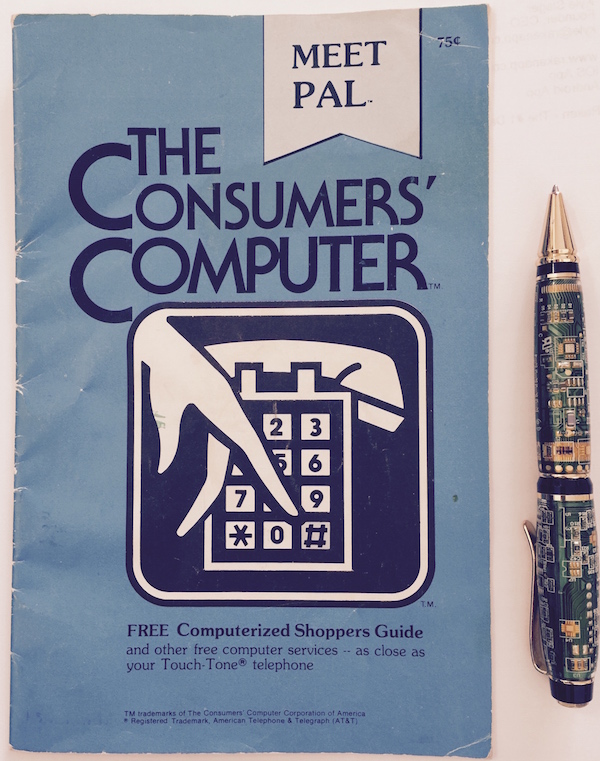
The PAL AdventureSo now it's several years later, and Dave gets to wondering whatever happened to Michael McCafferty, and gets my number in San Diego from my previous employer in Chicago (never burn your bridges). He calls me, and asks if I've made my first million yet. I had to admit I was still quite a bit short of that goal. He announces that he has sold his software company and was looking to invest in something and was wondering if I would "invent something and he will back me and we would make a lot of money and have fun, 50/50, ok?" So what did I have to lose, right? I'm selling Fiats! This was just treading water. However, since I had gone through this startup ordeal before, and if I was going to do it again, then I was determined to do it right this time. So I sat down with a clean sheet of paper, and made a list of all the things I wanted in an ideal business. The list looked something like this:
A creative, unique business that has never been done before, ever, anywhere. There were about 13 points on the paper after a lot of thought over many days. The only trouble was that I still had to invent the business to conform to these constraints. This took 3 months. The result was "PAL", the world's first completely free, round the clock, anonymous computer service, accessed over ordinary telephone lines, needing no computer for the user (only a Touch Tone telephone, PC's hadn't been invented yet). The application was a real-time replacement for the Yellow Pages, along with other free applications to gain traffic. It was, in fact, a precursor to Google and the World Wide Web that would come along more than 16 years later. Nothing like being a little ahead of the crowd... The name PAL was an acronym for "Product & Area Locator" and a take-off on "HAL", the computer in the movie 2001: A Space Odyssey. Callers would be greeted with a computer voice: "Hello, this is PAL, how may I help you?" The caller would reply by touching the keys on the phone that would spell out the name of a product or service and then their zip code, and PAL would locate the closest listing, speak the database information (including special offers going on now) and even switch the call, free, if the caller wanted. My potential investor Dave was overwhelmed. He thought maybe I would invent a software product (that would come later) and that the business model and target audience would be clearly defined and something he had experience with. This PAL stuff was completely beyond his comfort level. He wanted to have proof that such amazing things could be done with a computer. So I programmed the application on "GEnie", General Electric's timesharing service, probably the only online computer service that had a voice response system available for use on the network. When he saw an early prototype of PAL, he believed that it was technically feasible, but now he wanted proof that it could be sold. Would businesses really buy such a new fangled electronic Yellow Pages? To demonstrate the answer, I put together a group of experienced telemarketers in a small office in Cardiff-by-the-Sea, California, and we wrote a script for a one-shot phone presentation aimed at getting Cash Now. The pitch was that we told the prospect that there were amazing developments happening with computers (never an argument) and that they would be a great help to business (no argument) and individuals (no argument) and a huge leap in computers for everyone was just made right here in San Diego and would be released in 3 months to everyone who lived or worked in San Diego. We told these prospects that they were among the first businesses in San Diego to be contacted to participate in this wonderful opportunity, and if they signed up now they would be able to take advantage of introductory special prices, AND they would also be able to reserve the best of a very limited number of ad spots that their competition would never be able to take over (as long as they kept paying the bills). Put another way, we were telling them that this thing had never been done before, and that we were going to do it in three months, and that we wanted them to sign up Now and we would be out that same day to pick up their check! That was the outrageous part to me, picking up the check right away. But I deferred to the experience of our telemarketers. They wanted to get paid, and they were paid commission only, and only on collected funds. They were experts at getting the money now. It was a beautiful thing to behold. What made all the difference was the real-time nature of this new advertising medium. It was possible for our employees to re-program PAL immediately to refer each new advertiser's information in the database. This completely binary situation, either you are in the database or you are not, coupled with the perception of the very limited number of ad spots (3). These conditions set a fire under the telemarketers, and their enthusiasm showed in their sales. Dave was convinced, and now all I had to do was make it happen. So with the money we raised selling the ads in advance, I bought a Cromemco Z2-H running the CP/M operating system. Soon I converted to "CROMIX" the first Unix-based operating system for microcomputers. The machine had only 64k memory with a 10MB hard disk drive and 4 modems and a Votrax voice response unit, and programmed the main software in COBOL myself, and subcontracted a couple of machine language subroutines. What I was asking this little toy computer to do was way beyond its capabilities, but somehow I got it to work. And finally, the big day arrived when I had to let the world know that PAL was alive and well, and that the world would never again be the same. This was a very big idea, and just before I pulled the trigger on the announcement, I got scared. I had no idea what the phone company would do when I announced it, but I knew they wouldn't like it. One of their big profit centers has always been the Yellow Pages. The phone company could easily squash my little business like a bug, or keep us tied up in court with injunctions until we gave up, or just cause a lot of line static, and interfere with the calls. There were plenty of ways they could cause problems, and it worried me a lot. And I struggled long and hard with the idea of actually notifying them of my idea before I went ahead, but I felt that was definitely the wrong way to go about it. They would study it forever before I got an answer, and the answer would probably be NO. This was one of those times when it would be "Better to Beg Forgiveness than to Ask Permission". The thing that got me to move ahead with confidence was one of my favorite quotes attributed to Goethe:
For Boldness has Genius, Power and Magic in it. Begin it Now. This was certainly a Dream, and it surely required Boldness, so when it was all ready to announce, I sat down and wrote up a Press Release, and slipped a few copies in the mail to the media. The first to bite was XETV, a San Diego run station transmitting from a tower in Tijuana, Mexico. They called me in to do an on-camera interview and it aired that same night. The rest, as they say, is history. The storyline was about this relatively young computer guy (me!) who invents this free public computer service you can use on your phone. And about how it will change everything. I was off on a huge roller-coaster ride, one of the biggest adventures of my life! The next day the press was all over it, and the following day there were TV interviews on the rest of the stations in the area. Once the press got hold of it, it went out over the UPI news wire and was written up in newspapers throughout the US.
My parents called to say I had finally made it into their local paper (Philadelphia Inquirer). The fallout was even more interesting. The Discovery Channel wanted to learn more about how to use my new service as a way of doing interactive TV. They invited me to a think tank in Maryland to join with some other brains to think new thoughts on the convergence of TV and computers. Everyone wanted to see the computer. But I wouldn't allow it. It had to remain a mystery. If they ever saw my butt-ugly stack of cheap hardware with tangled wires everywhere, they wouldn't believe their eyes. They would, every one of them, expect to see something much larger. They would expect that a machine that would handle the inquiries a million San Diegans to be a giant. If they saw it, it would be trivialized. Competitors could get greedy thoughts. It would be best if the computer stayed a mystery. Soon enough it wasn't news anymore. We had to prove ourselves. Before we announced the service, it was easy to sell on speculation. After the service was turned on, then we became real and advertisers wanted real numbers so they could make intelligent decisions about the keywords and zip codes they should buy. It completely changed the dynamic of selling. The nail in the coffin for PAL was my partner Dave. When he saw that he would have to invest real (serious) money, he bailed out. Abruptly. I was left with a brand new startup with a bad case of "Cashus Interruptus". I had to pay rent and payroll and suppliers... and what the heck was I going to do? It was a long, slow, painful time for PAL. I moved him out of his office and into my spare bedroom, and only had one phone line, but he was alive to the world, and living to serve. Soon the vultures appeared. A guy from out of nowhere, Joe Labert, shows up and figures he can get the money needed to get going again. He brings in Jimmy Geiger. Joe and Jimmy sold motor homes together at La Mesa RV, a motorhome dealer. Jimmy knows a guy in Mexico with more money than God, and he can get us a shot at presenting the idea, but if this thing happens then it will be equal shares for Joe, Jimmy and me, and the other 51% for the guy from Mexico. That dropped me from 100% of the company to 16%, but I was shark bait, and there was no way I could resist. When we showed up in Mexico City, and as we were ushered into an office, Max (the Money Man) came rushing by, and announced that his brother had just had a heart problem in Houston and Max was leaving on his jet to go there now, but that he had about 20 minutes to learn about this new business he had heard about. This was devastating! I was told that I would have meetings over 4 days to go into detail about this fantastic, global business that would soon change the world. Instead of 4 days, I had 20 minutes. I talked like a man possessed of his subject, passionate and knowledgeable, and as convincinly as one who had kissed the Blarney stone. At the end of 20 minutes, Max makes a move to get up, and I go in for the close immediately, extending my hand: "So, Max, partners?" He shook my hand and we had a deal. PAL would live again. But the adventure would become very strange indeed. Max poured a ton of money into the business, and we learned a lot along the way. For example: when people can anonymously request anything they can think of, just by keying it in on their telephone, what would you expect would be the top two things they want? Did you say Food and Sex? Well, to be more specific, it is Pizza and Topless Bars. Can you imagine the kind of demographic information we could gather, by Zip Code? It was fantastic! But even the best business idea the world has ever seen (am I being a bit un-humble here?) can still go horribly awry. A successful business needs a lot more than a great idea. And I learned that lesson the hard way... Instead of going into some of the gory details of the devolution of PAL into nothingness, let's simply say that it devolved. From that same nothingness sprang the vision of what became, 15 years later, what we now call the internet, Google, Amazon, Facebook and more...
|
|
After PAL ended, there was a year of being stuck, wondering "why me?". I was living on my credit cards. Then the bill collectors started calling and that's when I realized that I had hit the wall. I filed for personal bankruptcy on St. Patrick's Day, March 17, 1983 and Started Over from scratch. It took a lot of energy to focus on coming back from total ruin. The only good thing is that there was nowhere to go but Up. Things had to get better, by definition. How I did it is summarized in a couple of published books, the short story is that I started over with nothing, and over the next 10 years built a profitable business that was eventually bought out by a much larger company. This allowed me to live an interesting and comfortable life for the next 32 years (and counting...). It was the TeleMagic adventure that was my biggest and best in terms of speed of growth, profitability, and ultimate benefit to customers. |
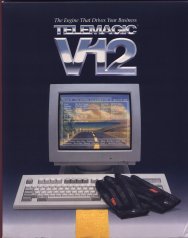
And finally, putting it all together,
|
|
The success of the TeleMagic software adventure
produced the resources to own a magnificent open-cockpit biplane
and allowed the time to learn to fly, and "go flying". My inner entrepreneur thought it would be a good idea to set up a company to give biplane rides up and down the beach. My instructor did the rides until I got my license. 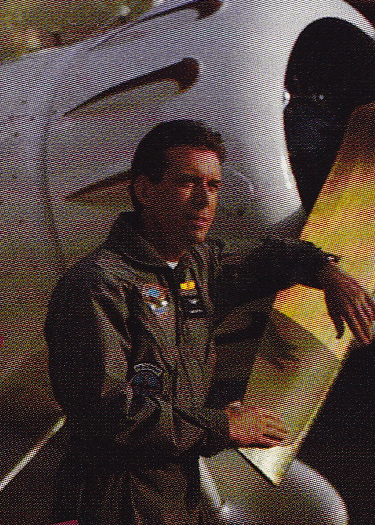
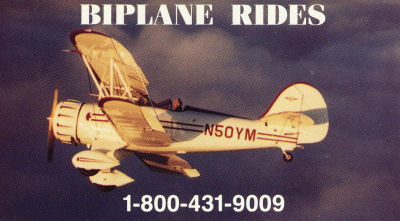
Air Mikie Biplane Rides was short-lived. The chief pilot landed with the parking brake on and the beautiful biplane was completely totalled. Luckily no customers were aboard, and he was unhurt. I closed the business. The insurance payoff allowed me to get another biplane and I continued to fly, mostly solo, for another 6 years. Click here to read the stories of my adventures flying an open-cockpit biplane. |
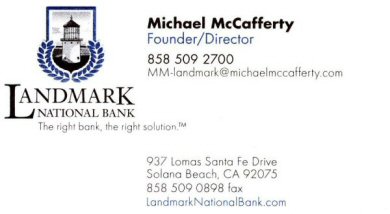 That takes us up to The Landmark National Bank adventure, which ended on October 25, 2006 when I resigned as a Director. Click here for the full story of Landmark National Bank. |
As you might expect, I always have a couple of software products in "stealth mode".
But enough about my past experiences.
Let's talk about your future experiences!
How may I help you in your business adventures?
Check out my blog for entrepreneurs, startup founders, and CEOs:
Begin It Now!
